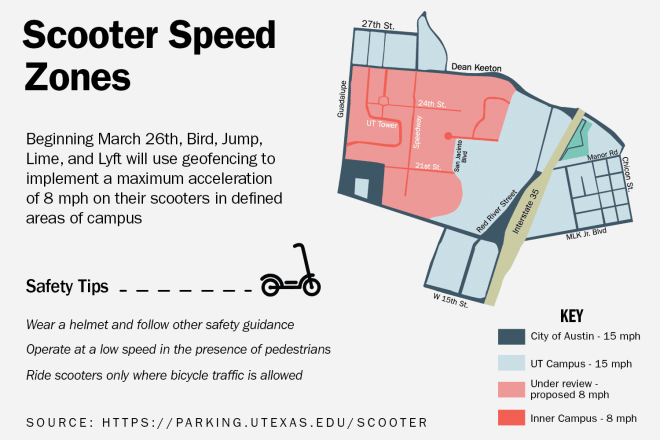I reported here last year on the excitement and challenges of e-scooters on campus.
There have been some interesting developments in the US recently as universities try to deal with the impact of large numbers of these electric scooters on their campuses. As this recent report in the Chronicle notes, the impact has been significant at some institutions:
Using one is easy. Download an app to your smartphone, use it to unlock a scooter near you, and hop on. That technology-enabled ease has appealed to younger people, who’ve long been used to nontraditional modes of transportation.
That’s the case for Jonah Gallegos, a senior studying journalism at New Mexico State University. Scooters made by the company Spin have, thanks in part to efforts by the student government, recently taken the campus by storm, proving so popular that Gallegos said fully charged machines can be hard to find.
New Mexico, a mostly rural state, often feels behind the curve, he said, but the adoption of scooters feels pleasantly modern. “We don’t see that much nice stuff here,” he said. “I have texted all my friends to get the app.” He added that the scooters also help save him the cost of a parking permit, costing just a few dollars a ride.
Park life
Etiquette on use has taken some time to establish leading to some problems, particularly with parking. It seemed that the general approach was for students simply to abandon the scooters at the end of their ride, causing significant obstructions to other traffic. Universities sometimes had to impound large numbers of scooters – the University of Texas at Austin impounded about 700 before creating a set of scooter guidelines and designated parking areas.
Blanca Gamez, assistant director of Parking and Transportation Services at the university, notes that there are real benefits in reducing other traffic on campus. And she gets the appeal of riding one, too:
They’re really easy,” Gamez said. “They don’t require any type of practice. They’re relatively cheap. There’s a novelty to them because they’re so new. “
Danger!
They really do sound like fun. But there are real safety fears – and the same news item notes a recent study on scooter collisions which reports that:
249 people were admitted to two urban emergency rooms over the course of the year in connection to scooter collisions. About 92 percent were riders, but the rest weren’t. About 30 percent had fractures. And 40 percent suffered head injuries. Tarak K. Trivedi, the study’s lead author and a research fellow at the University of California at Los Angeles, also wrote that few people were taking any safety precautions when riding the machines.
“Riders share roads with fast-moving vehicular traffic but appear to underestimate hazards,” the report reads. “We found that 94.3 percent of observed riders in our community were not wearing a helmet.”
Perhaps in response to this kind of information UT-Austin has recently introduced a speed limit for scooters in the busier areas of campus

Although most scooters can travel up to 15 mph, a campus work group recommended an 8 mph speed limit for dockless electric scooters over winter break. PTS announced the 8 mph speed limit would be coming sometime during the spring semester in an email sent Jan. 22.
The speed limit will be enforced by a virtual geofence using GPS. Once a scooter enters the geofenced area on campus, the device will gradually decelerate down to 8 mph. The new geofenced speed zone is a precautionary measure for the safety of everyone on campus, according to the PTS email.
PTS director Bobby Stone said the department worked with all four scooter companies licensed to operate on campus and arrived at 8 mph as an agreeable speed limit.
“We wanted to make sure that the speed that we use was at the rate which we thought was safe to mix with pedestrians, but we also wanted to make sure that the speed allowed the scooter to continue to operate safely,” Stone said.
Drop the Pilot
This sounds like a reasonable compromise, and it appears that others have either followed suit or simply gone for a complete ban.
Meanwhile, Forbes reports that the first steps have been taken to introduce e-scooters in the UK with the launch by Bird of a pilot at the Queen Elizabeth Olympic Park. This will start with scooters being restricted to a 1-mile stretch of private footpath. Legally, at present, electric scooters can be ridden on private land only:
Technology always comes ahead of legislation,” Richard Corbett, head of Bird UK told Forbes.
“What we can do is we can ride on private land. Effectively this means that we can launch in locations such as airports, universities, business campuses and parks with the landowner’s permission.”
Nevertheless, there may be change on the way at some point. Other European cities have embraced e-scooters and the report also suggests that Loughborough University, which has a site in Stratford, may be considering testing scooters at its home campus.
Will we see e-scooters at a UK university this year?













One hopes not as the treaderists are bad enough as it is.